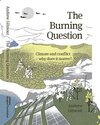The Burning Question: climate and conflict - why does it matter?
von Andrew GilmourClimate change presents a number of threats to security: meaning here the security of individuals, communities, provinces, states, and entire regions. Some of these threats translate more or less into contributory causes of conflict. Without getting into the slightly pointless debate about the precise correlation between rising ambient temperatures and rising human tensions, this book seeks to examine the various linkages between climate and conflict, and the different pathways that exist to turn changes of climate into intensified sources of conflict. These regrettable pathways derive from climate change itself directly. But they also derive from measures that people are taking to counter the causes and the effects of altered weather patterns (so, more indirectly).
Countries in conflict are often those that are disproportionately affected by climate change (by the greenhouse gases that other, wealthier and less affected countries have emitted). They also receive — precisely because they are in conflict — the smallest quantities of climate finance.
This state of affairs cannot be allowed to continue. The only people who benefit _t from it are those who seek to profit from violence and instability. Moreover, in the longer run, countries in conflict (or even those associated with it from a distance, as we can see from the fall-out of the Ukraine war) are distracted from the global necessity of taking action against climate change, to the detriment of everyone.
Admittedly the topic of this book is not exactly an uplifting one. If reading about the impact of climate change can be depressing enough on its own, combining it with its effect on conflict may seem almost gratuitously gloom-laden. For me, and I hope a growing number of others, the number one burning question is to consider how best to understand and then respond to the many, varied links between climate and conflict. Failing to do so adequately will have catastrophic results.
Countries in conflict are often those that are disproportionately affected by climate change (by the greenhouse gases that other, wealthier and less affected countries have emitted). They also receive — precisely because they are in conflict — the smallest quantities of climate finance.
This state of affairs cannot be allowed to continue. The only people who benefit _t from it are those who seek to profit from violence and instability. Moreover, in the longer run, countries in conflict (or even those associated with it from a distance, as we can see from the fall-out of the Ukraine war) are distracted from the global necessity of taking action against climate change, to the detriment of everyone.
Admittedly the topic of this book is not exactly an uplifting one. If reading about the impact of climate change can be depressing enough on its own, combining it with its effect on conflict may seem almost gratuitously gloom-laden. For me, and I hope a growing number of others, the number one burning question is to consider how best to understand and then respond to the many, varied links between climate and conflict. Failing to do so adequately will have catastrophic results.






